Income, Food, and Jobs: Material Benefits of Urban Farming in Indian Cities
By Swarnika Sharma, Maitreyi Koduganti, Prathijna Poonacha
Every decade, millions of new residents move to the ever-growing cities of India in search of a better livelihood. Among the numerous opportunities that cities provide, urban agriculture is a promising entry-point to green jobs and income generation, particularly among the economically weaker sections of society. Several practitioners, entrepreneurs, and collectives offer unique opportunities to urban and peri-urban populations, while individuals continue to find ways to increase their income and save costs on food and health expenses. Through this essay, we provide a bird’s eye view of how urban farming helps in stimulating the local economy, involving individuals and collectives to social enterprises and business platforms.
1. Urban farming by individuals
Heaven on My Earth: Ann Vinya Thomas runs Heaven on My Earth (H.O.M.E.), an urban farming initiative in Bengaluru that supplies leafy greens and provides training on starting a home garden. She began her journey in 2017 after realising that she was ‘paying taxes to put poisoned food on her plate’. Within an area of less than 100 sq. feet on her terrace, Ann grows exotic varieties of greens in a greenhouse using hydroponics. Although her target customers are high-income families, she is attempting to supply microgreens to middle-income families using natural farming practices.
“ Once the initial investment is done, there is continuous yield, leading to economic sustainability. Hydroponics uses one-tenth of the water that goes into regular farming, and I am reusing this water as well. With this, I am saving the money that I would otherwise spend on outside food. Now I know where my food comes from and all of what I do is sustainable ”
- Ann Vinya Thomas
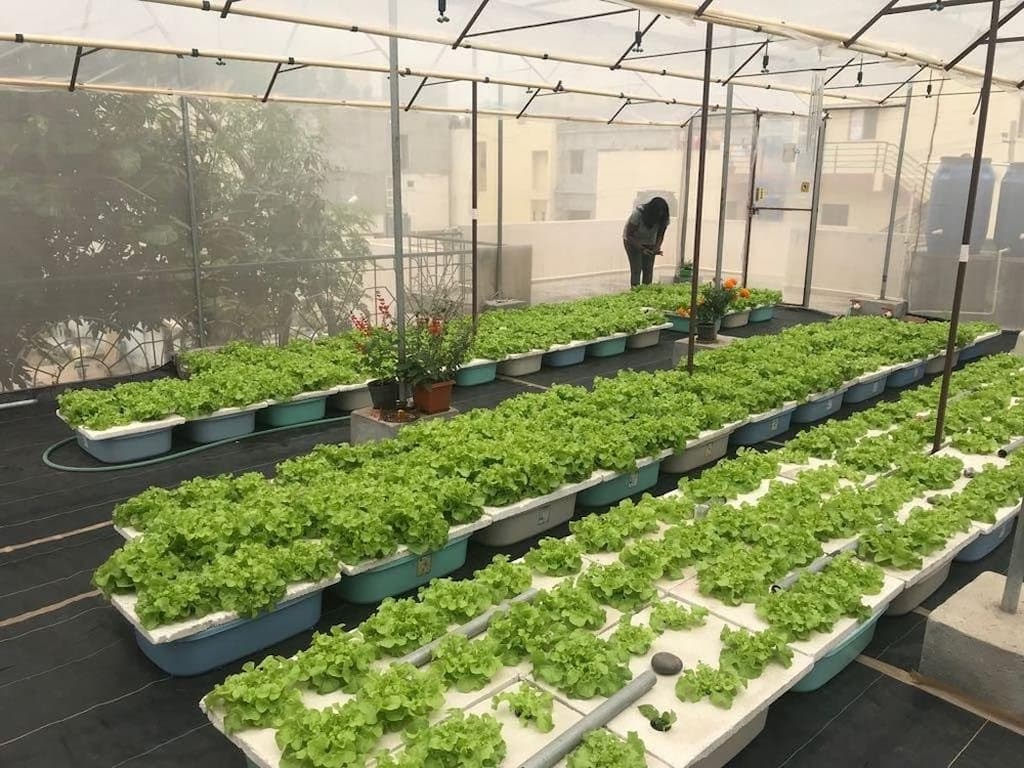
Exotic Greens Grown in a Greenhouse on a Terrace, Bengaluru
Source: https://www.thebetterindia.com/157032/news-bengaluru-urban-farming-hydroponics/
2. Urban farming through farmers’ collectives
Abhinav Farmers Club: Several farmers across India struggle to sustain and maximise their income with traditional agriculture. The challenge is greater for peri-urban farmers, who face the additional burden of dealing with the impact of rapid urbanisation. In 1999, a group of 11 farmers came together to set up Abhinav Farmers Club (AFC) in Pune, a farmers’ collective under the leadership of Dhyaneshwar Bhodke. Formalised in 2004, AFC’s primary aim is to support farmers and supply chemical-free food. Today, the collective has more than 1.5 lakh farmers under its ambit, spread across India, and directly links them to over 3 lakh urban customers in Maharashtra via a mobile application through which they supply milk, fruits, and vegetables. The collective trains its members in chemical-free farming practices at a nominal fee in response to the demands of an urban market to which they supply, demonstrating that such approaches can be made economically viable and sustainable.
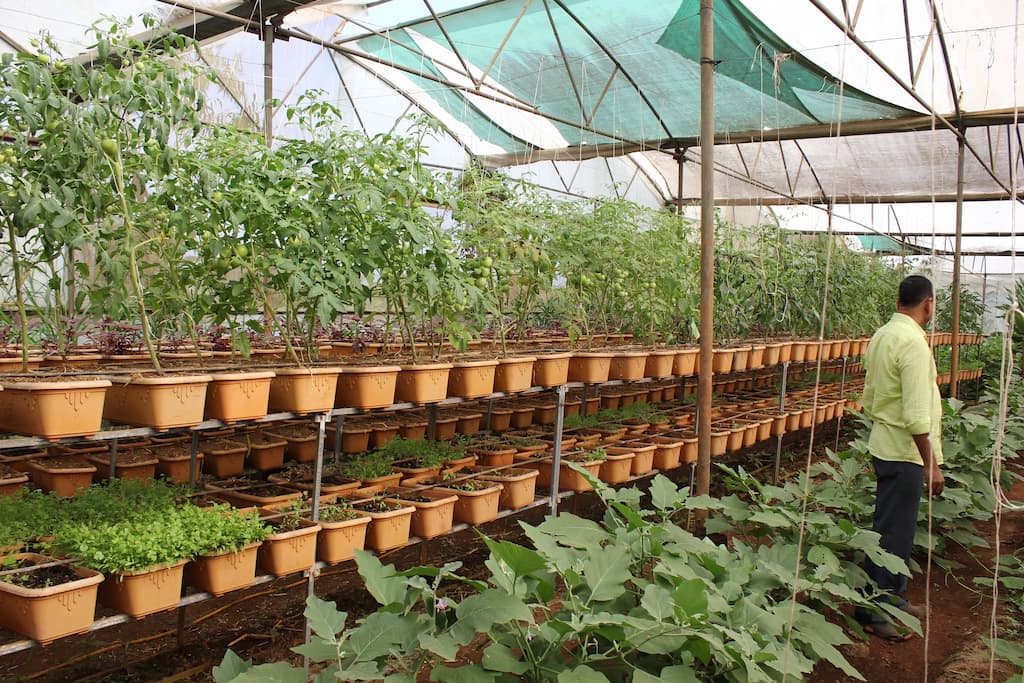
Three-tier Cropping System at AFC, Pune
Source: Swarnika Sharma
To improve efficiency and reduce input costs, In addition to guaranteed improvements in income for farmers, the AFC has also generated over 700 jobs in packaging, transportation, and marketing along its entire supply chain, with approximately 70 per cent of these benefiting women. At a time when many young members of traditional farming families are opting out of agriculture, the AFC is inspiring the youth to continue farming by creating opportunities and exemplifying farming as a viable and lucrative livelihood option. The club makes use of technological innovations like smart watering systems and salt filtration units
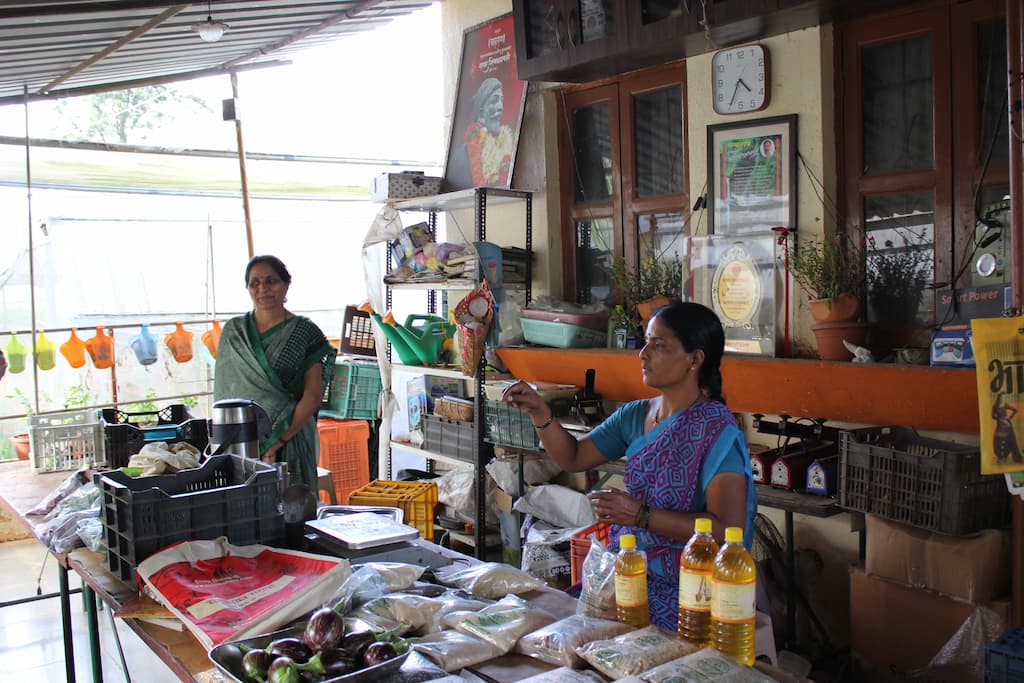
Women Selling Produce at the AFC Store
Source: Swarnika Sharma
3. Urban Farming through social enterprises
Social enterprises like iKheti and Urban Mali were set up with an aim to provide livelihood opportunities for the urban poor, particularly those who migrate to cities due to economically unsustainable livelihoods in their villages while responding to the increasing demand for urban gardens and farms.
iKheti: Started in Mumbai in 2012, iKheti operates in more than 10 cities, enabling urban residents to grow food on their own premises. They help set up gardens, offer the expertise of malis (gardeners), and provide gardening inputs, maintenance, and related services.
“ My malis are the backbone of iKheti’s success. We have close to 40 malis and we try to support them by providing meals, travel allowances, and loans in times of emergency. ”
- Priyanka Shah, the founder of iKheti.
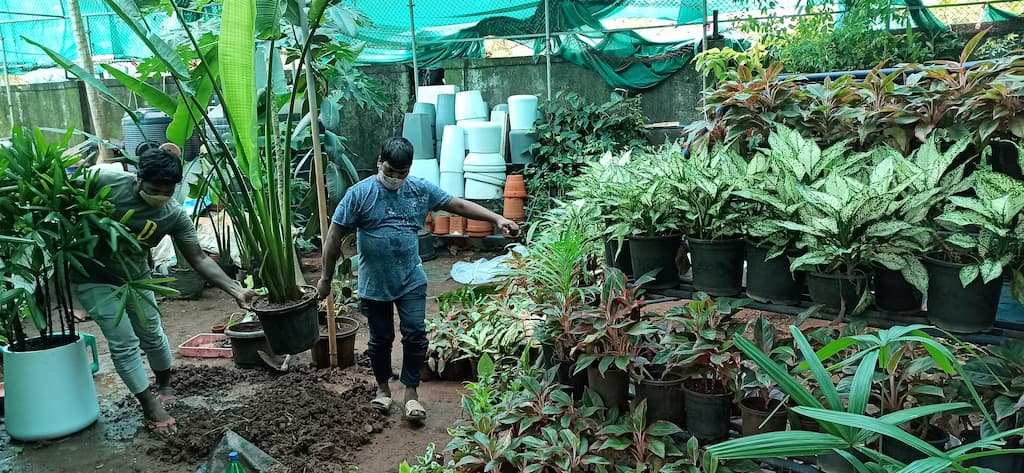
Gardeners Working in the iKheti Nursery, Mumbai
Source: Swarnika Sharma
UrbanMali: Started in Bengaluru in 2017, Bengaluru’s UrbanMali employs migrant farmers and provides organic farming and gardening solutions to urban residents. They manage over 5,000 gardens in the city and have empowered more than 50 gardeners, ‘ensuring dignified employment, a healthy income, and a support network,’ as noted by Vandana Krishnamurthy, the CEO and co-founder.
In times of need, the gardeners can avail microfinance options in the form of small loans and salary advances. The enterprise keeps the gardeners at the forefront and relies on their expertise to build and retain their customer base.
“ Our identity is based on the gardeners and their work. Being farmers by profession, working with plants and soil runs in their blood. We don’t have to really train them, since they already know quite a lot ”
- Vandana Krishnamurthy
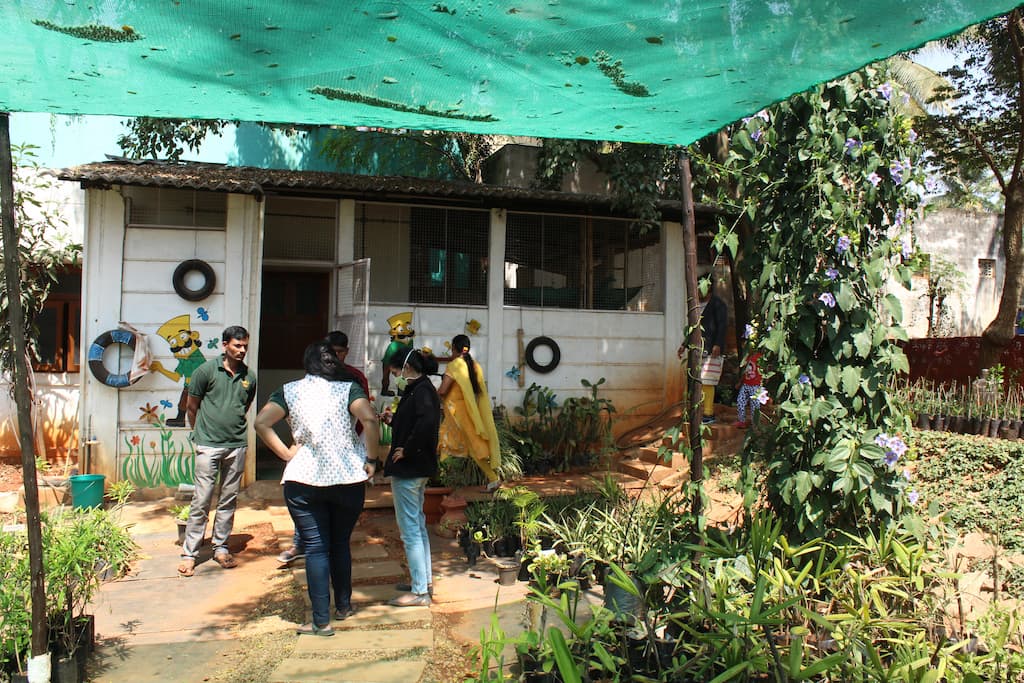
Founder of UrbanMali in Conversation with Employees
Source: Amruth Kiran
4. Urban farming through online platforms
Farmizen: Bengaluru-based business Farmizen uses digital platforms to connect consumers with local farmers and in turn improves income and livelihood opportunities for urban and peri-urban farmers. As a farm-to-fork marketplace, they provide two services. On one hand, they connect farmers with urban consumers, while on the other hand, they provide mini-farm services where customers can opt to grow their own food with the help of local farmers.
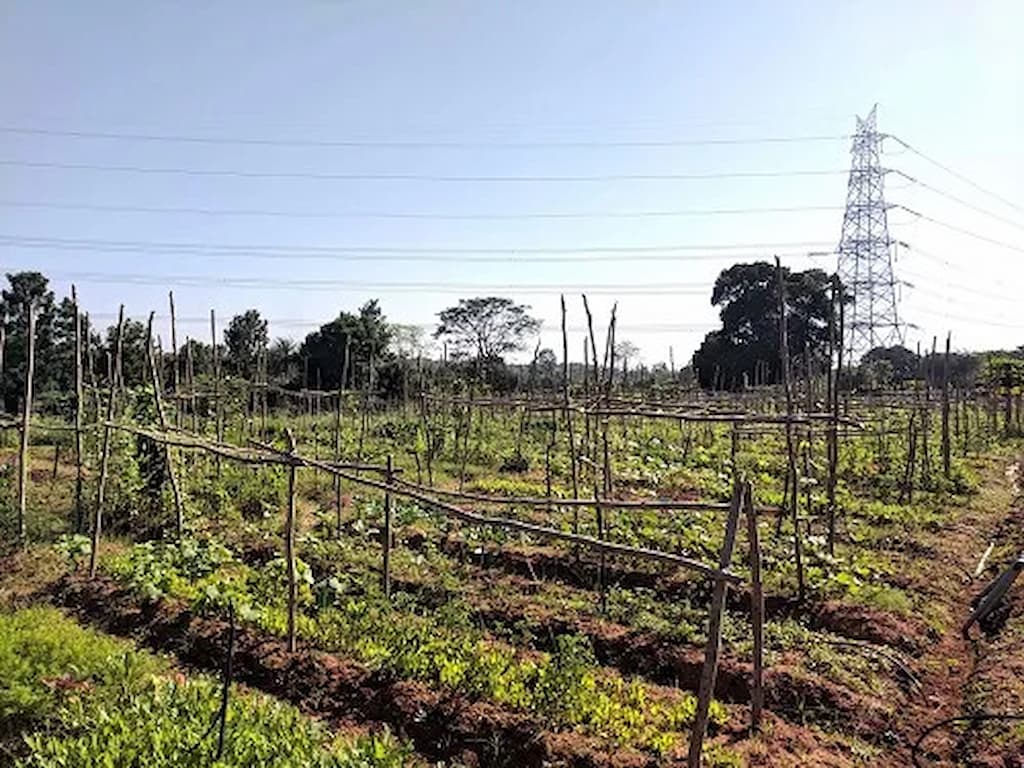
Farmizen Farm
Source: https://www.farmizen.com/
“ It is interesting to see that while many traditional farmers leave the profession, there is a new set of young farmers who are also returning to the field. They might not have farming knowledge, but they have better business knowledge. They realise that they cannot depend on just one buyer, but rather diversify and sell to multiple people. ”
- Co-founder Shameek Chakravarthy
Farmizen exemplifies how a digital platform provides young farmers with lucrative business opportunities while consumers are able to access fresh organic food.
My Dream Garden: Set up by Ashok Kumar in a mere two yards of land in 2012, My Dream Garden has now expanded to over 8,500 gardensacross Bengaluru, serving private residents, corporate companies, hospitals, and academic institutions. In the process, it has generated livelihood opportunities in both gardening and administrative roles, employing close to 100 people, half of whom are migrant workers from states like Odisha and Chhattisgarh. By 2024, Ashok aims to expand his business across 150 Indian cities in a phased franchise model.
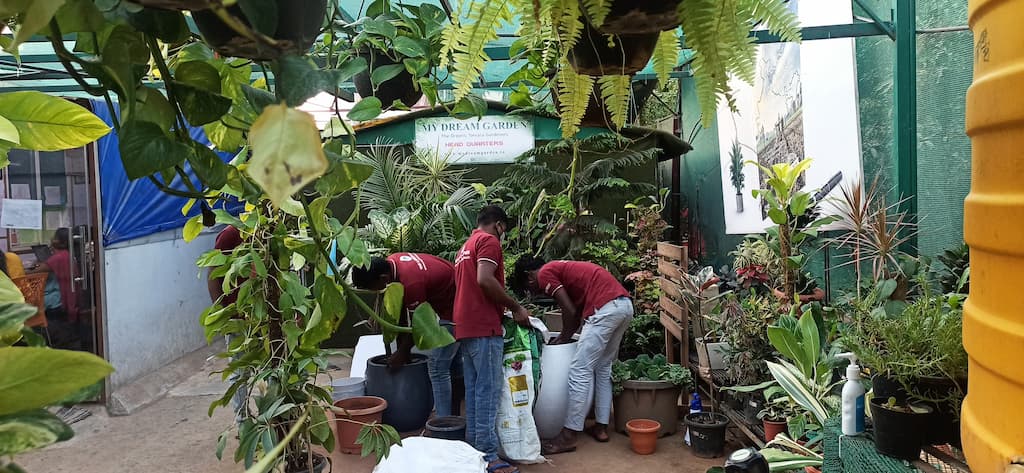
Gardeners Working at My Dream Garden Facility, Bengaluru
Source: Swarnika Sharma
“ Some of us have prior experience with farming, while others get trained here by senior gardeners for a period of three months. The company and its founder takes care of us, listens to our problems, and even provides timely loans during difficult times. Even if we make mistakes, they explain it nicely. That’s why we like working here and don’t feel like leaving. ”
- Shiva (name changed)
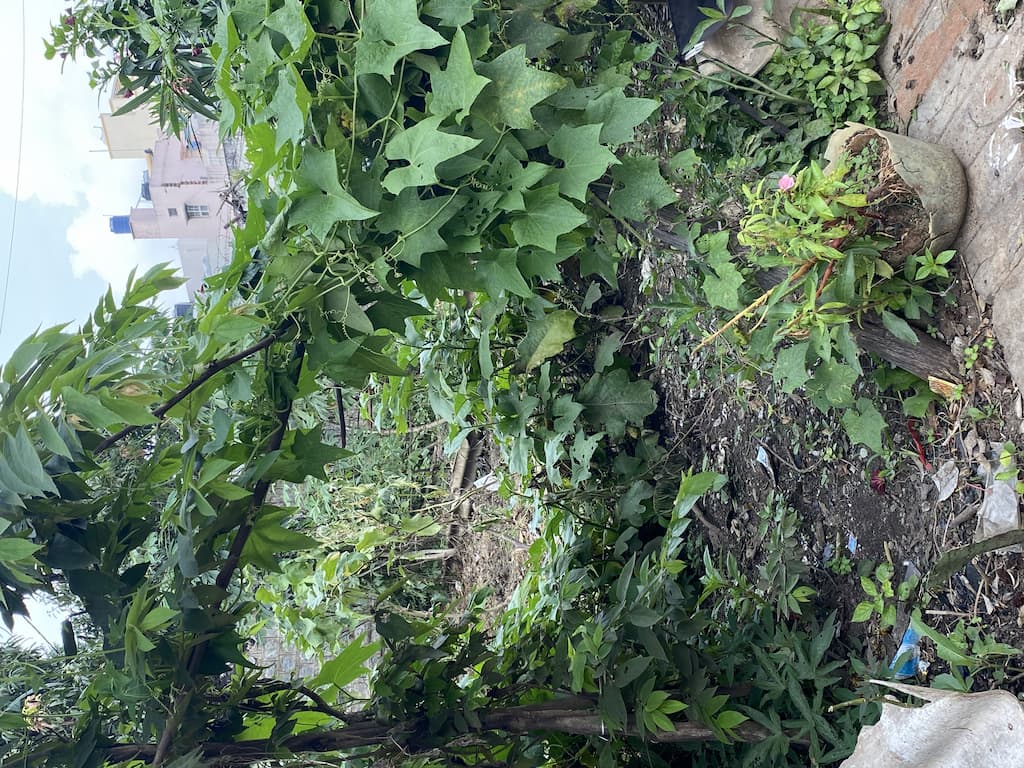
Gardening on Empty Plot in a Low-income Settlement, Bengaluru
Source: Maitreyi Koduganti
5. Urban farming in low-income settlements
Residents of low-income neighbourhoods find innovative ways to use limited space for growing edible and ornamental plants. For many, this serves as an additional source of food, income, and savings on food and health expenses. For example, a daily-wage labourer from MD Block in Bengaluru grows various fruits and vegetables around his house, making use of the limited space available to him. He says,
“ I distribute excess produce in the neighbourhood and people pay me as they wish. I sell some greens and banana leaves. ”
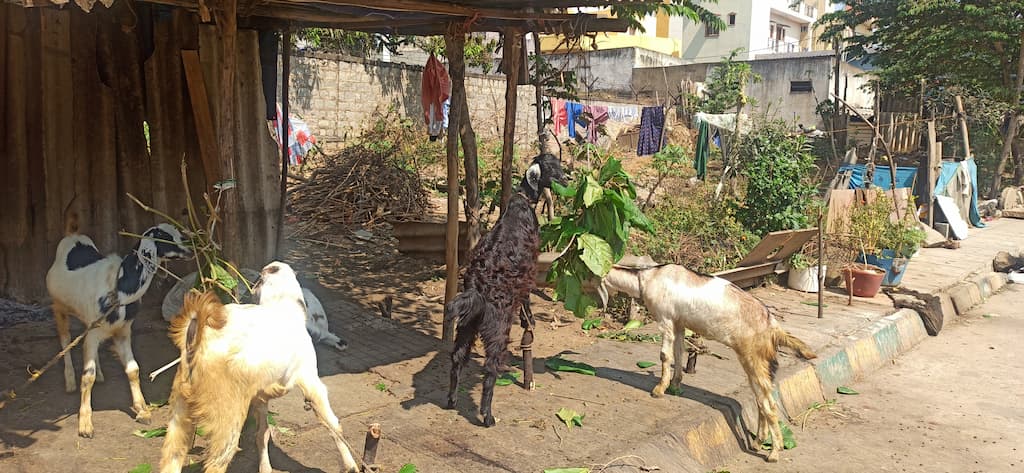
Goat Rearing in a Low-income Settlement, Bengaluru
Source: Kruthika Nagananda
Another construction worker in Peenya Industrial Area, Bengaluru maintains a community farm on an empty plot opposite his house. Owing to limited availability of food during the COVID-19-induced lockdown, he dedicated himself to growing fruits, vegetables, and millets. He also owns three goats and uses goat dung as compost for his garden.
“ Rather than buying from the market, I prefer ploughing, growing, and eating [my own food]. Every 3–4 days, I get some produce during the growing season. I rely only on my produce, whenever there is enough. This way my spending on food and groceries comes down ”
- A construction worker in Peenya Industrial Area, Bengaluru.
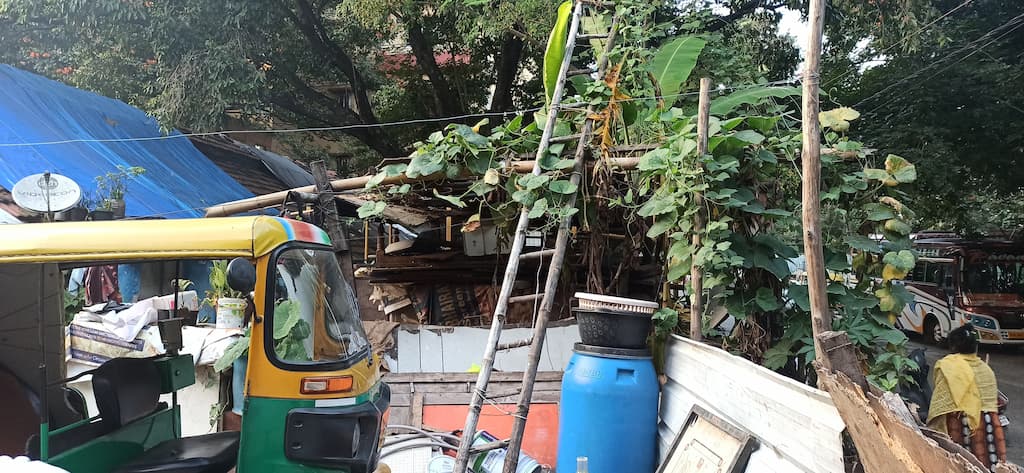
Farming on the Roadside in a Low-income Settlement, Bengaluru
Source: Swarnika Sharma